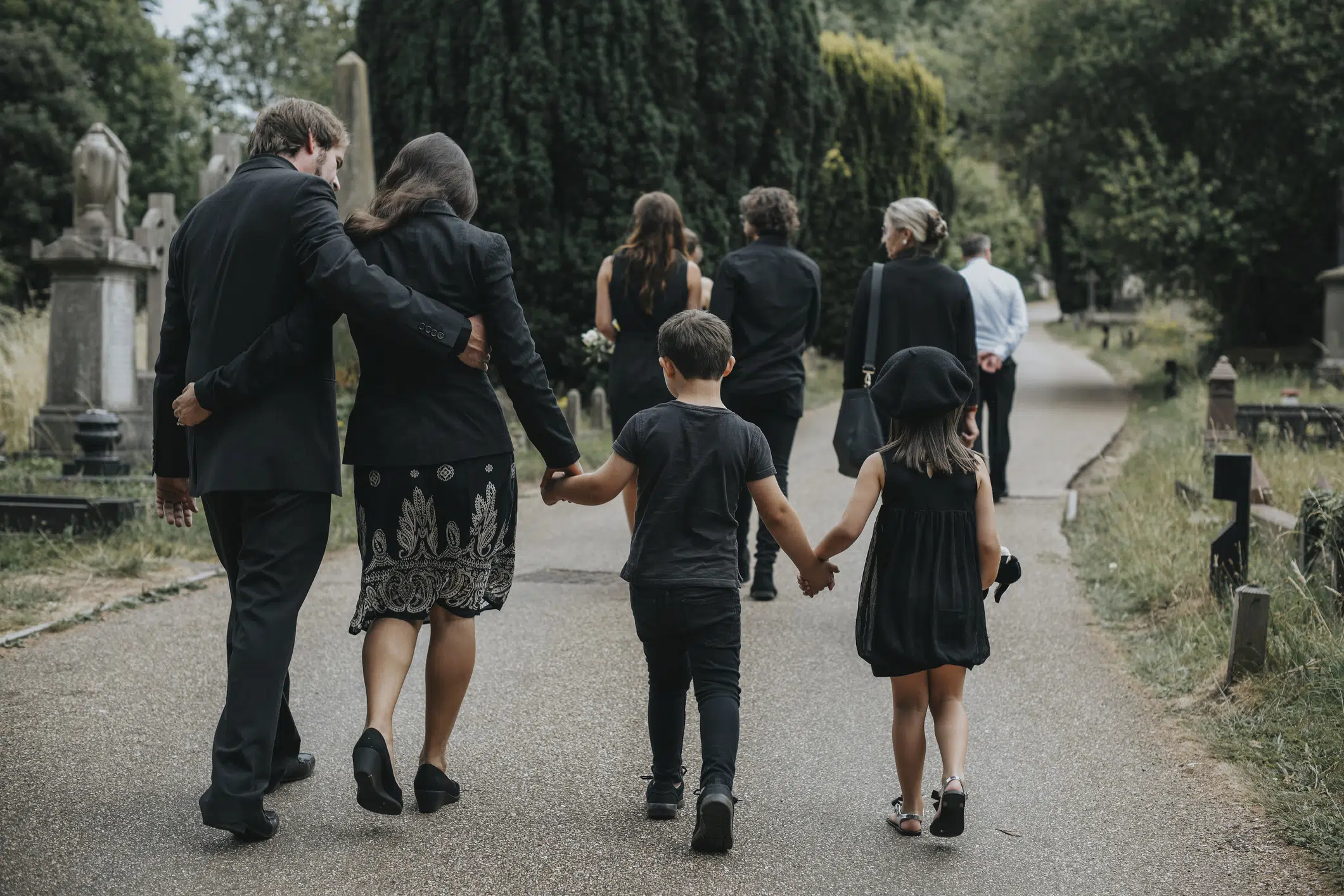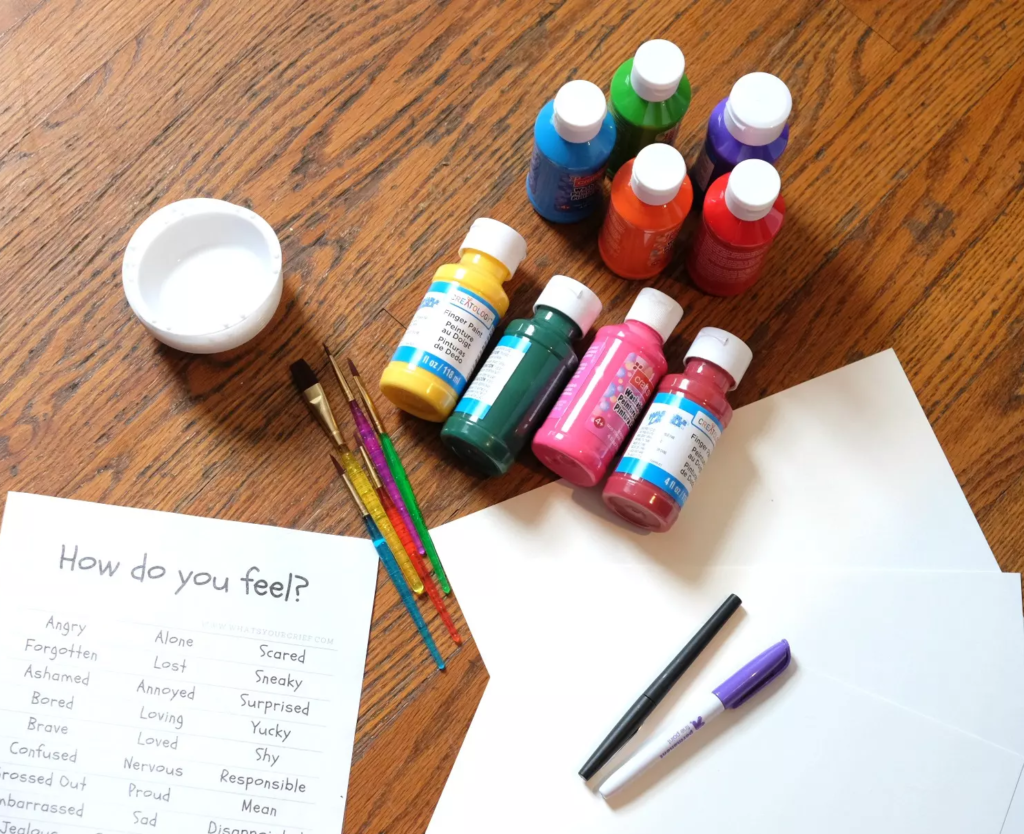
Should Children Attend Funerals?
The first funeral I remember attending was for my grandmother when I was eight years old. I really didn’t understand much about funerals, especially in second grade. I remember being at the funeral home and looking at my grandmother’s memorial brochure and marveling at how close to her birthday she had died.
When I was 12, my grandfather died and I remember a lot of people standing around the room talking, with my grandfather in the casket at the front. We went to the visitation, the funeral, and then to the cemetery. I’m not sure how going to a funeral at a young age affected me, but they are events I clearly remember decades later.
Funerals can be important family rituals. When are they done well and reflect the life of the person who has died, they can be part of the healing process. Funerals acknowledge grief over losing a loved one, and they do so as part of a community of friends and family.
How Do Know if Your Child is Ready?
So how do you know if a child is ready? It depends on the child’s age and maturity level—are they able to act appropriately at other family events, for instance? If this is the case, ask them whether they want to attend, says Kenneth J. Doka Ph.D. And then explain to them what will happen during the service all the way from who will be there to the open casket. It’s important to give your child simple and honest explanations, and then ask what he understands, says the American Academy of Pediatrics. Take time to clear up any misinterpretations.
Children’s Understanding Varies by Age
When someone we have a connection to dies, we grieve, regardless of age. Even infants can understand the absence of a caregiver, according to the website healgrief.org. Below is a summary of how each age group understands what death means.
-
PRE-SCHOOLERS:
Understanding that the deceased is not coming back is a big step for a child attending a funeral. Pre-schoolers might struggle with this concept since they may think that death is temporary, believing death is reversible—reinforced by what they see in cartoons where the characters die and come back to life, according to the American Academy of Child & Adolescent Psychiatry (AACAP).
-
CHILDREN AGES 4-7:
Also view death as temporary but also might believe the death is their fault, according to Vitas Health Care. In this age range, a child believes everything revolves around them, and they may have been angry and said something to the person who died—and then think they caused it. It’s important to reassure them that’s not the case. “Sometimes children have this really uncanny way of assigning blame to themselves for things that have nothing to do with them,” says board-certified licensed professional counselor Tammy Lewis Wilborn in the HuffPost on “How to Talk to Your Kids About Death and Dying.”
-
SCHOOL-AGED CHILDREN 7-12:
begin to view death as permanent and irreversible and associate death with a physical being, such as a ghost. They tend to believe that death can be avoided if you try hard enough. Common reactions to death in school-aged children may include difficulty concentrating in school, problems sleeping, stomachaches and headaches, according to HealthyChildren.org. They are very curious and may ask candid questions about death, cremation, or burial.
-
TEENS
understand death on the same level as adults. They may resist talking about their feelings, which can lead to acting out. Teens may feel guilt over being alive or anger over their lack of control, according to HealthyChildren.org. The best thing you can do is encourage them to express their grief in healthy ways and let them know that asking for help is not a weakness, but a strength.
Key Points to Consider
Here are some key points to keep in mind when you’re having a conversation about the death of a loved one with your child. Remember it’s important to talk to them so they understand what’s happened, and so you can ask them questions about how they feel, and what they need.
-
Don’t lie. “Tell them the ‘facts’ about the death,” says clinical psychologist John Mayer. “This is an opportune time to teach them about death,” he continues. “Don’t shy away from it.”
-
Words like “death,” “died” or “dying” may sound harsh, but this is still developmentally appropriate language, notes Wilborn. “It’s important for children to have the language to understand the permanence of death,” she continues.
-
That said, your conversation with your child should be based on their developmental age and their understanding of what happens when someone dies. They don’t need all the information about how someone died, “but they need enough age-appropriate details to understand that a person has died and isn’t coming back,” says Wilborn.
-
Don’t force them to go to the funeral or burial. If they choose to go, let them decide whether they want to view the open casket, for instance.
Grief Is Complicated
As it is for adults, children will need to process their grief, and it may not look like your definition of sadness. Sometimes grief reveals itself in changes in sleeping or eating patterns, or problems at school. A child can suffer a devastating loss and feel sad, and then they can go play, says Chandra Ghosh Ippen, associate director of the child trauma research program at the University of California in San Francisco. “You may be thinking, ‘Were they really affected by what happened?’”
Children just grieve differently and discharge their sadness by doing something else, like playing. Like adults, a child’s grief can take time. “Grief is a process that you cannot go around. You have to go through it. So, you need to be OK with the pace of the process,” says Wilborn.
Grief is also expressed differently by children in the same household, and that’s ok too. Allow each child to show their grief in their own way.
A Safe Place to Express Grief
Before she died, my grandmother gave my sister and me silver chain link bracelets with our names inscribed. I know she gave my two brothers something as well. I didn’t realize until decades later she did this so we would have something tangible to remember her by. I’m sure I didn’t understand at the time she gave us the bracelets that it meant she would no longer be physically with us. It was my grandmother’s way of leaving a piece of her with us.
It can be difficult for adults to talk about a person who has died but doing so can be an opportunity to “teach your children that all the experiences and memories you have had with this loved one do not get erased with their death,” says Mayer.
Additionally, talking to your child about death can help them cope with other inevitable losses in their life, from relationships to transitioning from high school to college. Children need to know that “home is a resource where grief is welcome,” adds Wilborn. “Being a resource for your child creates a sense of safety and security,” she continues.
Activities for Kids
After the funeral is a “good time to help kids understand that complex emotional experiences are okay and normal,” writes Eleanor Haley in the blog “What’s Your Grief.” We can be happy even when we’re feeling sad. Grief doesn’t end when the service is over. It ebbs and flows and shows up when we least expect it.
Two activities that illustrate this are painting and a sand jar. Both involve different colors of paint or sand to represent different emotions and mix those together. Just like our emotions can be mixed, so can the different colors—”they don’t cancel each other out, but rather they combine to create something new,” Haley writes. For details on how to do each activity, read “Exploring the Mixed-Up Emotions of Grief: Art Activities for Kids.”
Many other resources are available to help your child, including Sesame Street’s online grief toolkit.
The Only Way Out is Through

Grief is not something to fix. It is something to be validated and acknowledged. “Some things cannot be fixed. They can only be carried,” says grief expert and author Megan Devine. “We’ve got to stop talking about grief as a problem to be solved,” she continues.
Death is hard on those who remain behind. There is no way around it. Communicating clearly with your child about what has happened, what it means, and what will happen at the funeral and burial are important in helping them understand the death of someone close to them. As the parent or caregiver, the decision is ultimately up to you, based on the individual child. Perhaps also becoming a lesson in learning that it’s ok to lean on our community to support us in our grief, which doesn’t end when the service and burial are over.
by Carrie Phelps-Campbell, Sunset Contributor



Post a comment